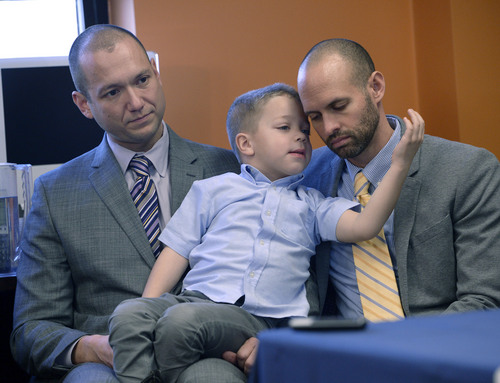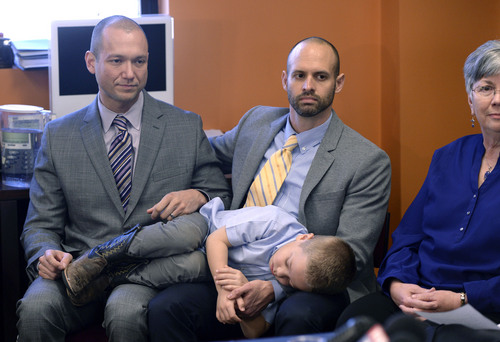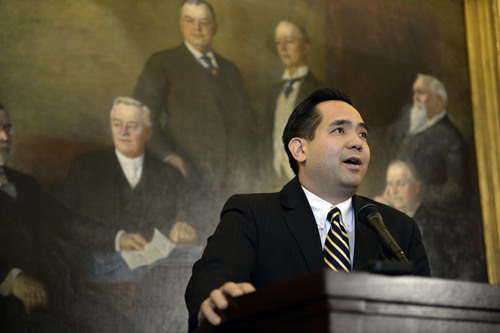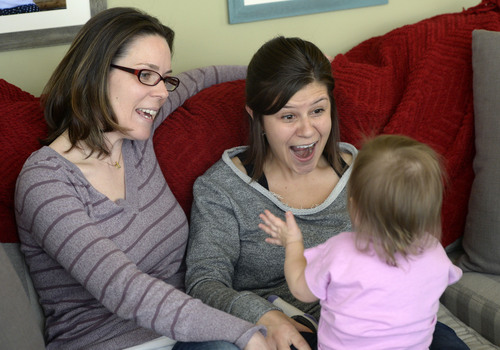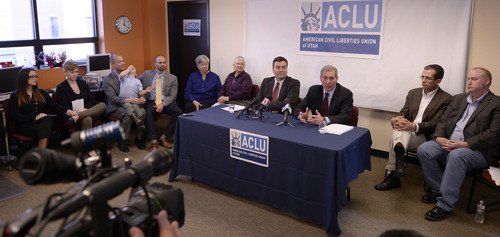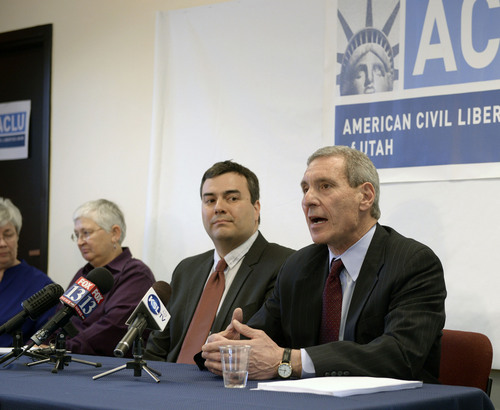This is an archived article that was published on sltrib.com in 2014, and information in the article may be outdated. It is provided only for personal research purposes and may not be reprinted.
The Utah Supreme Court may intervene in a federal lawsuit that asks whether same-sex couples who married in Utah should be recognized and receive spousal benefits.
It's what both sides want.
The Utah Attorney General's Office filed a proposed order in federal court Friday asking that the state's highest court resolve the question of whether gay and lesbian couples who wed after U.S. District Judge Robert J. Shelby struck down Utah's ban on same-sex unions in December have "vested property rights" under Utah law.
The plaintiffs in the case, four same-sex couples, also have asked that the state supreme court to weigh in — though the question they posed was much broader: Are same-sex couples who were legally married in the 17 days before the U.S. Supreme Court halted these weddings covered by the same rights and benefits that opposite-sex couples receive when they are married in Utah?
It's a question, the attorney general's office contended, that addresses a state statute, and should therefore be ruled on by the state's top judicial authority for the sake of consistency and clarity.
Already there is a case pending before Utah's high court that asks state justices to determine whether two state court judges "abused" their discretion in granting adoptions to same-sex couples who were married in Utah after Shelby's historic Dec. 20 ruling.
"Should the Utah Supreme Court rule on the vested rights issue, there is a serious risk of conflicting rulings," Assistant Attorney General Kyle J. Kaiser wrote to U.S. District Court Dale A. Kimball, who is presiding over the case. "For example, if this court rules that there is a likelihood of success on the issue of whether same-sex couples have vested rights in their marriage licenses, but the Utah supreme court rules that no vested rights exist, the executive agencies of Utah would be faced with contradictory rulings. This scenario —or even the possibility thereof — would 'dramatically expand the could of uncertainty that now hangs over' the lives of all the citizens of Utah, and the agents of the government."
Some state court judges granted adoption petitions to married gay and lesbian couples — with two judges in Salt Lake City having gone so far as to order the state health department to amend the birth certificates of children to reflect their adoptions.
Earlier this month, the state asked Utah's Supreme Court to block the birth-certificate orders so same-sex couples would not be able to get updated birth certificates for their children, citing the ongoing battle over the state's right to define marriage as a union between one man and one woman.
"This is all about trying to slow down adoptions that have been ordered by judges, which shows that judges think the law is clear and it's the executive branch that's trying to gum up the works by trying to go to the Supreme Court," John Mejia, legal director for the American Civil Liberties Union of Utah, told the Tribune late Saturday. "Marriages have vested rights from the moment they are solemnized."
One of the plaintiff couples in the federal court case — Matthew Barraza and Tony Milner — was granted a petition in state court that would allow Milner to legally adopt Barazza's son.
An unknown number of same-sex couples who married after Utah's Amendment 3 was overturned subsequently filed second-parent adoption petitions.
Adoption proceedings are private and records are not listed on the court's docketing system.
But according to several attorneys for same-sex couples, some judges asked them to notify the Utah Attorney General's Office of the proceedings.
The attorney general filed opinions in those cases asking the judges to dismiss the petitions or have the couples withdraw them until there is a final resolution of its appeal contesting U.S. District Court Judge Robert J. Shelby's Dec. 20 ruling that the ban on same-sex marriage is unconstitutional.
Both sides of the marriage debate are awaiting a ruling from the 10th Circuit Court of Appeals after Utah argued its case before a panel of three judges earlier this month.
Should the 10th Circuit rule in Utah's favor, many fear the state could invalidate the nearly 1,300 same-sex marriages performed in Utah.
If the plaintiffs prevail, laws banning same-sex unions in Colorado, Kansas, New Mexico, Oklahoma, Utah and Wyoming would be deemed unconstitutional and overturned.
"At the end of the day, if it's a vested right, it's a vested right for all married couples," Mejia said. "There shouldn't be a question of this kind of marriage or that kind of marriage. Either they're married, or they're not."
Twitter: @Marissa_Jae


